 Operation and Maintenance
Operation and Maintenance
 Linux Operation and Maintenance
Linux Operation and Maintenance
 Detailed introduction to TOMCAT cluster under NGINX reverse proxy in LINUX
Detailed introduction to TOMCAT cluster under NGINX reverse proxy in LINUX
Detailed introduction to TOMCAT cluster under NGINX reverse proxy in LINUX
The following editor will bring you an article about TOMCAT cluster under NGINX reverse proxy in LINUX (detailed explanation). The editor thinks it’s pretty good, so I’ll share it with you now and give it as a reference. Let’s follow the editor and take a look.
Nginx has the characteristics of reverse proxy (note the difference with forward proxy) and load balancing.
This time Nginx is installed on the linux machine 192.168.1.108. To install Nginx, you must first install the openssl library, gcc, PCRE, zlib library, etc.
Tomcat is installed on two machines, 192.168.1.168 and 192.168.1.178. The client accesses the project content deployed by Tomcat in
192.168.1.168 and 192.168.1.178 by accessing the 192.168.1.108 reverse proxy.
1. Install Nginx under Linux (machine 192.168.1.108)
Install openssl library.
yum install -y openssl openssl-devel

Need to install gcc: yum install gcc-c++

Install PCRE yum install -y pcre pcre-devel

yum install -y zlib zlib-devel
 ##Installed under /usr/local/
##Installed under /usr/local/
 Extract tar -zxvf nginx-1.13.0.tar.gz
Extract tar -zxvf nginx-1.13.0.tar.gz
##Enter the directory and run ./configure to generate make file
file
There is an extra makefile in the directory
Compile make
Installation: make install
Start nginx
 Window access 192.168.1.108 nginx default port is 80
Window access 192.168.1.108 nginx default port is 80
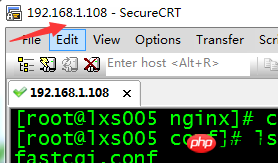
top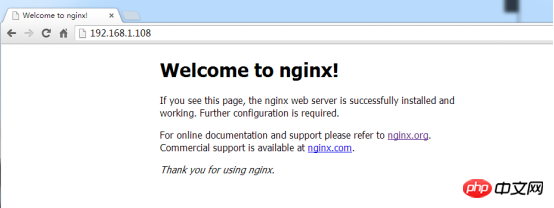

configuration file after startup 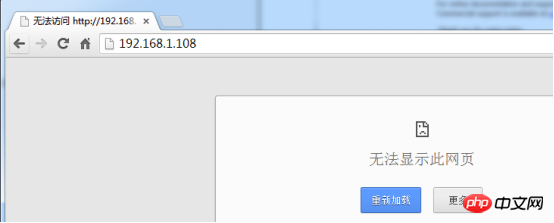 Suitable for modifying the configuration file during startup
Suitable for modifying the configuration file during startup
 2. Install Tomcat under Linux (192.168.1.168 and 192.168.1.178 machines)
2. Install Tomcat under Linux (192.168.1.168 and 192.168.1.178 machines)
The installation process is very simple and will not be described. . Install Tomcat on the other two Linux machines (192.168.1.168 and 192.168.1.178), and deploy any project nginxTest. One content is 1111... and the other is 22222...
At this time, I am accessing a different IP address, and I have not yet configured Nginx as a reverse proxy server.
3. Nginx serves as a reverse proxy server
Mainly configure the contents of nginx.confa.
Configure servergroup, add upstream configuration between http{} nodes.
192.168.1.168:9090 and 192.168.1.178:9191 are Tomcat of the other two Linux machines (see 2 above)upstream lxstest{
server 192.168.1.168:9090;
server 192.168.1.178:9191;
}
b. 修改nginx监听的端口号80,改为7777(随便改个都行,不改也行)。
server {
listen 7777;
......
}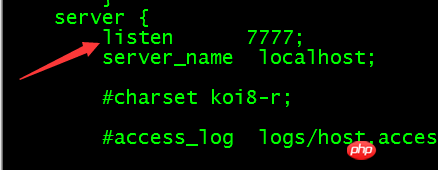
c. 在location{}中,利用proxy_pass配置反向代理地址;此处“http://”不能少,后面的地址要和第一步upstream定义的名称保持一致。(上述的是 lxstest,所以http://lxstest)
location / {
root html;
index index.html index.htm;
proxy_pass http://lxstest;
}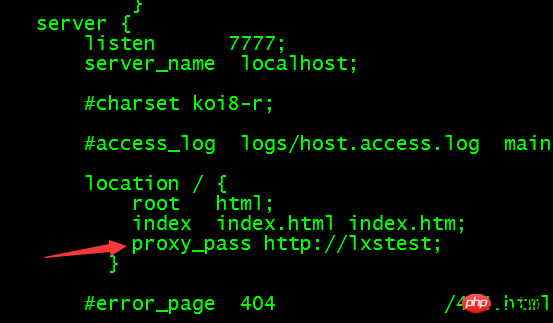
上述修改完后,启动 192.168.1.108机器的Nginx
最后访问 192.168.1.108:7777/nginxTest 同一个地址出来不同的页面,说明一会儿访问的是192.168.1.168,一会儿访问的是192.168.1.178
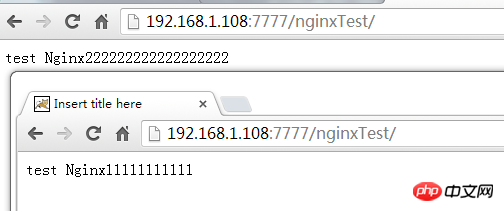
http://192.168.1.108:7777
等同于==== 
等同于===== 
最后就会找到对应的Tomcat
再找到对应的nginxTest工程。
The above is the detailed content of Detailed introduction to TOMCAT cluster under NGINX reverse proxy in LINUX. For more information, please follow other related articles on the PHP Chinese website!

Hot AI Tools

Undresser.AI Undress
AI-powered app for creating realistic nude photos

AI Clothes Remover
Online AI tool for removing clothes from photos.

Undress AI Tool
Undress images for free

Clothoff.io
AI clothes remover

Video Face Swap
Swap faces in any video effortlessly with our completely free AI face swap tool!

Hot Article

Hot Tools

Notepad++7.3.1
Easy-to-use and free code editor

SublimeText3 Chinese version
Chinese version, very easy to use

Zend Studio 13.0.1
Powerful PHP integrated development environment

Dreamweaver CS6
Visual web development tools

SublimeText3 Mac version
God-level code editing software (SublimeText3)

Hot Topics
 1392
1392
 52
52
 What computer configuration is required for vscode
Apr 15, 2025 pm 09:48 PM
What computer configuration is required for vscode
Apr 15, 2025 pm 09:48 PM
VS Code system requirements: Operating system: Windows 10 and above, macOS 10.12 and above, Linux distribution processor: minimum 1.6 GHz, recommended 2.0 GHz and above memory: minimum 512 MB, recommended 4 GB and above storage space: minimum 250 MB, recommended 1 GB and above other requirements: stable network connection, Xorg/Wayland (Linux)
 Can vscode be used for mac
Apr 15, 2025 pm 07:36 PM
Can vscode be used for mac
Apr 15, 2025 pm 07:36 PM
VS Code is available on Mac. It has powerful extensions, Git integration, terminal and debugger, and also offers a wealth of setup options. However, for particularly large projects or highly professional development, VS Code may have performance or functional limitations.
 How to run java code in notepad
Apr 16, 2025 pm 07:39 PM
How to run java code in notepad
Apr 16, 2025 pm 07:39 PM
Although Notepad cannot run Java code directly, it can be achieved by using other tools: using the command line compiler (javac) to generate a bytecode file (filename.class). Use the Java interpreter (java) to interpret bytecode, execute the code, and output the result.
 What is the main purpose of Linux?
Apr 16, 2025 am 12:19 AM
What is the main purpose of Linux?
Apr 16, 2025 am 12:19 AM
The main uses of Linux include: 1. Server operating system, 2. Embedded system, 3. Desktop operating system, 4. Development and testing environment. Linux excels in these areas, providing stability, security and efficient development tools.
 vscode Previous Next Shortcut Key
Apr 15, 2025 pm 10:51 PM
vscode Previous Next Shortcut Key
Apr 15, 2025 pm 10:51 PM
VS Code One-step/Next step shortcut key usage: One-step (backward): Windows/Linux: Ctrl ←; macOS: Cmd ←Next step (forward): Windows/Linux: Ctrl →; macOS: Cmd →
 How to use VSCode
Apr 15, 2025 pm 11:21 PM
How to use VSCode
Apr 15, 2025 pm 11:21 PM
Visual Studio Code (VSCode) is a cross-platform, open source and free code editor developed by Microsoft. It is known for its lightweight, scalability and support for a wide range of programming languages. To install VSCode, please visit the official website to download and run the installer. When using VSCode, you can create new projects, edit code, debug code, navigate projects, expand VSCode, and manage settings. VSCode is available for Windows, macOS, and Linux, supports multiple programming languages and provides various extensions through Marketplace. Its advantages include lightweight, scalability, extensive language support, rich features and version
 How to check the warehouse address of git
Apr 17, 2025 pm 01:54 PM
How to check the warehouse address of git
Apr 17, 2025 pm 01:54 PM
To view the Git repository address, perform the following steps: 1. Open the command line and navigate to the repository directory; 2. Run the "git remote -v" command; 3. View the repository name in the output and its corresponding address.
 How to switch Chinese mode with vscode
Apr 15, 2025 pm 11:39 PM
How to switch Chinese mode with vscode
Apr 15, 2025 pm 11:39 PM
VS Code To switch Chinese mode: Open the settings interface (Windows/Linux: Ctrl, macOS: Cmd,) Search for "Editor: Language" settings Select "Chinese" in the drop-down menu Save settings and restart VS Code



